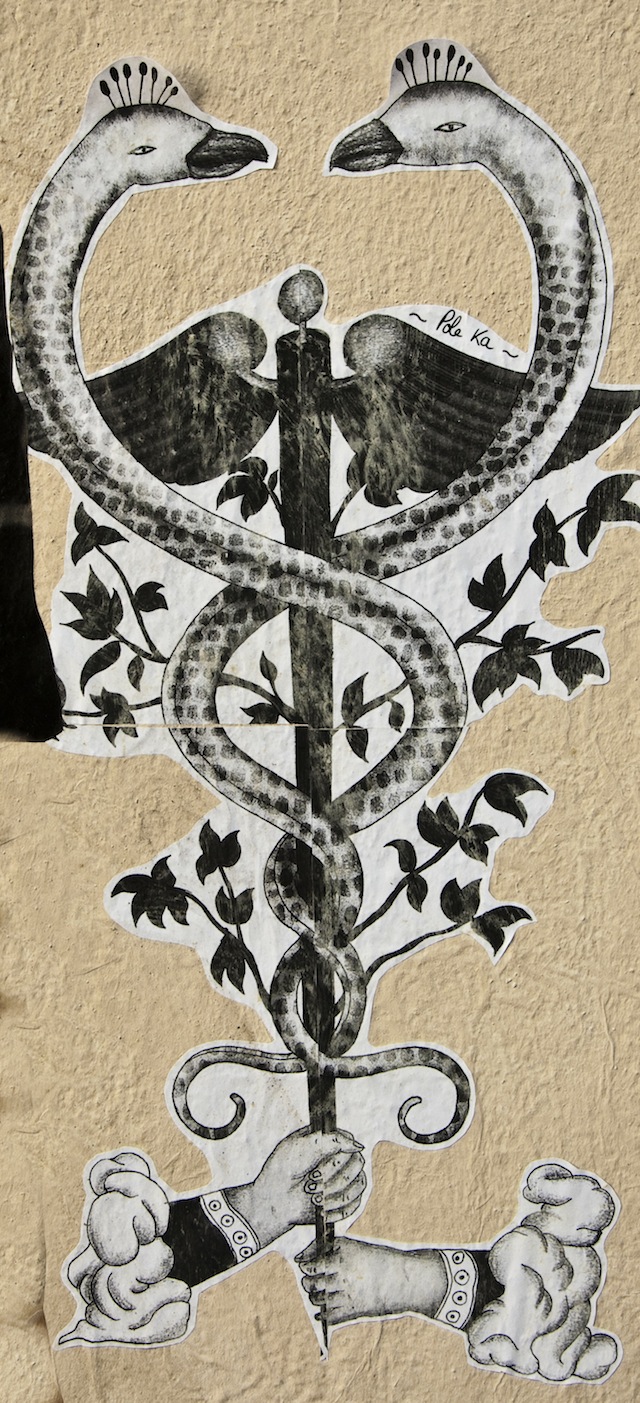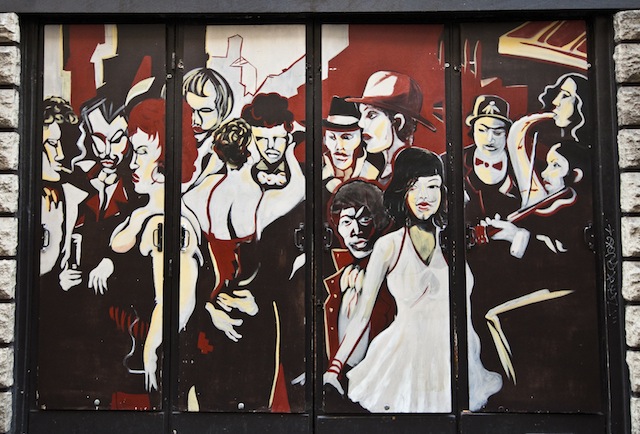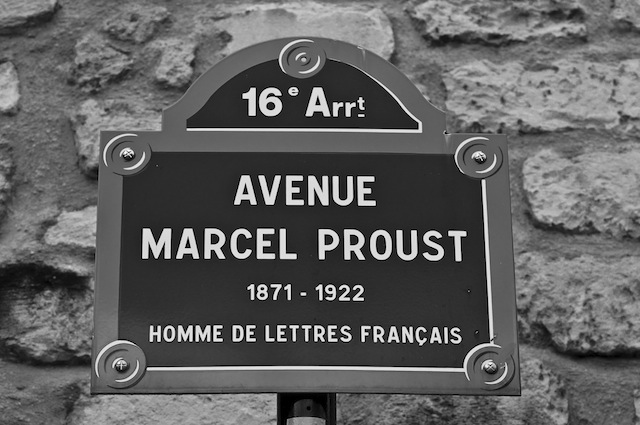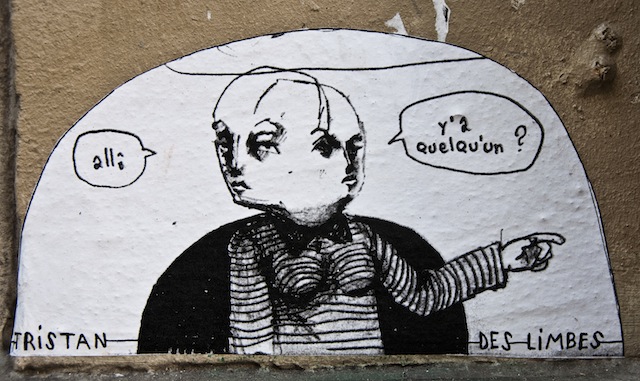A Night Alone in Paris
 10.29.2011
10.29.2011  Street art by Pole Ka
Street art by Pole Ka
Richard is sick in bed. He caught the flu at L’Alliance Francaise (one of the hazards of being in school), so I went alone tonight to pick up a book at Shakespeare & Company. And I got sick too, but in a different way.
A bookstore that stays open till 11 p.m. suits me just fine. Since I work at home, I often forget the difference between weekdays and weekends. Walking down St.-Germain at 9:30 p.m., I was surprised to find the cafes packed with people, the art galleries open, everyone in convivial spirits. Oh, right, Saturday night. I stepped into a gallery where a man in a beret was playing a violin, while a dark-haired woman writhed like a serpent in front of a seated audience. It was not particularly artful. Yet the seats were all taken. More people like to watch than get up on stage and perform, so the balance worked.

At Shakespeare & Company, I asked a young woman behind the counter if my Alain de Botton book had arrived. She searched the shelf behind her, speaking to me in English and French. Her English was so perfect, I assumed she was British, but no, she had just started learning it 11 years ago. She gets a lot of practice at the bookstore.

She handed me Botton's, How Proust Can Change Your Life. Margarita recommended it, and she loves Proust the way I love Proust. She’s also reading a biography of Proust, which she said makes him seem like a nasty man, but I find that hard to believe.
I browsed the fiction section and found two Jennifer Egan novels I hadn’t read, Invisible Circus and Look at Me. Extravagant, but I learned from my mother extravagance in buying books. She used to leave bookstores with a box of them in her arms. When I was a child and my parents had more children than money, she’d take us to the library every day for another Wizard of Oz. The passion for reading came from her, and she got it from her mother, Esther the poet, who ran off to Columbia for a year of graduate school, leaving two small children (one of whom was my mother) at home with her parents. While it was an agreement she’d made with my grandfather, who could start his medical practice now after finishing medical school, it was still a shocking thing for a small-town Minnesota woman to do, and I think cost her dearly in her husband and daughter’s affection.

On to the poetry section to see if the book I longed to read last night was there. I’d gone to every bookshelf in our apartment, unsure if we’d brought it or donated it to Antioch, our MFA alma mater, when we moved. Hélas! It was nowhere to be found at home.
But here! Here it was at Shakespeare. I grabbed the only copy of Ezra Pound’s The Cantos, and headed for the red theater chair in the next room to read a little of each Egan, and decided, of course I needed them both, and then dipped into The Cantos.

The French woman clerk came in with an English colleague to put some art books to bed. They were bedding the books above me, and to both sides, so I offered to move. No, no, they said, in the relaxed way that characterizes this bookstore.
We talked about learning English and French. Terry said that he surrounded himself with French people, played soccer with an all-French team, sang phrases while he showered, just bore down on it like a jackhammer. He practiced saying words with French friends, asking them over and over, “Am I saying it correctly?” After four years, he was fluent. Both were fluent in both languages. But, they teased each other, “I can still tell you’re French when you say certain words.” “Well, I can tell you’re English,” she sing-songed back.

I listened to a couple speaking German.
Another couple came in and spoke Spanish, from somewhere in the Americas.
And then a couple spoke what sounded to me like Chinese, but perhaps was not? Japanese? No, they looked and sounded Chinese.
I went back to reading The Cantos, and read a line about Chinese or Japanese. Hmmm. That was strange.
I asked the woman if she spoke English or French.
 Street art by Tristan des Limbes
Street art by Tristan des Limbes
English, she said.
“I was just wondering if you were speaking Chinese or Japanese,” I said. “And then I read this.” I showed her the line.
She nodded, as if to say, Very strange indeed, but she was looking at me, not the text.
I came in for two books, but I wanted all four. I’m trying to be frugal—the exchange rate from dollars to euros is nuts right now; imagine everything costing one-third extra—but frugality doesn’t apply when it comes to books. I was programmed that way in childhood.

I meandered out into the cooler autumn air, past the oldest tree in Paris, a robina planted in 1636, which has a crutch beneath it like a figure in a Salvador Dali painting. Maybe I’d try a new restaurant I’d passed on the way. I wanted healthy tonight more than delicious, and Le Grenier de Notre Dame promised wholesome vegetarian fare. It was intimate and beautifully lit, and the waiter was warm and wall-eyed, and recommended a vegetable pie, and I sat and read The Cantos, and ate a perfectly delicious, perfectly healthy meal.
I was again ensorcelled by Pound’s way of weaving myth, history, poetry of other times, astronomy, astrology, philosophy, beauty of place, Italian, French, English, German, Chinese, Latin, Greek, his own memories, his obsession with economic justice and wise rule, and the occasional expression of a heart that seemed cracked with scapegoating and hatred—the works. Oh, but the richness.
I read:
“nothing matters but the quality
of the affection—
in the end—that has carved the trace in the mind
dove sta memoria”

The couple two tables away spoke Italian, he in a caressing soft tone, she like a barking dog. She had tattoos on her arms that looked like the exquisite graffiti on the walls around here. I glanced at each of them. I’m fascinated by volume, how some nationalities speak loudly, some softly. Italians, like Americans, speak as if they’re on stage. French people tend to speak as if they’re in the bedroom, and sometimes as if they want you to get in bed too.
I was struck by how softly this Italian man was speaking. But the moment after I glanced over at the two of them, he began to bark back at his companion, as if caught in the act of being too gentle, too refined.
And I walked home at 11 p.m., feeling perfectly safe on a Saturday night in this city where my soul is so at home, sick—sick with love.


